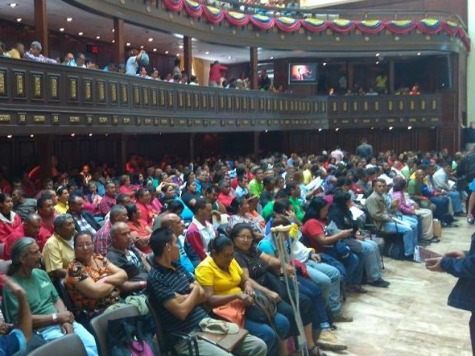The socialist Venezuelan government has announced the establishment of a new legislative institution called the “National Communal Parliament,” an unconstitutional parallel legislature intended to usurp power from the nation’s legislature before the opposition takes majority control in January.
“The most important power there is is the power of the communes, there is no other form of organization,” outgoing National Assembly head and nation’s second-in-command Diosdado Cabello said of the new institution, adding that only “revolutionaries” should be governing within the communes. As the UK Telegraph notes, Cabello did not specify what the powers of this assembly would be, only noted that it would work simultaneously with the national legislature to give leftists a bigger voice, particularly in light of the overwhelming defeat suffered by the leftists in the December 6 election in the National Assembly.
TeleSurTV, an outlet sympathetic to the Chavista dictatorship, claims the Communal Parliament will fulfill “distinct responsibilities from the National Assembly … clearly outlined in the country’s constitution,” and that Venezuelan socialists have been establishing “street assemblies” since the December election to “exchange ideas.” Those assemblies are not as organic as TeleSur portrays them, however; President Nicolás Maduro ordered members of the socialist party to engage in day-long “crusades to strengthen the Revolution” in the immediate aftermath of his defeat.
TeleSur is also incorrect to classify the creation of a parallel socialist legislature as constitutional, according to Venezuelan constitutional attorneys. “This has no legal basis anywhere, this does not exist in any part of the Constitution and, if what they desire to do is create a species of … parallel Assembly, well, the National Assembly that begins its functions on January 5 has no reason to recognize this,” constitutional attorney José Manuel Rafalli told Unión Radio. He went on to call the commune “nonsense.” Gerardo Blyde, another Venezuelan constitutional attorney, warned that the Communal Parliament could be a type of soft coup d’etat.
Newspaper El Espectador notes that, while communes are designated as legal entities in the Venezuelan constitution, they are meant to be a form of local government, and there is no precedent for a national “commune” that would function similarly to the National Assembly.
The Venezuelan government has been reeling since its decisive defeat on December 6, where the opposition Democratic Unity Roundtable (MUD) party won 109 seats to the Socialist Party’s (PSUV) 55, the first time the socialists will be out of power in the legislature since before dictator Hugo Chávez’s tenure. While Maduro vowed to respect the results of the election, he has threatened to cut social programs, including public housing, because, he said, “I asked for your support and you didn’t give it to me.” He then began purging government agencies of opposition voters. At the Venezuelan Food Production and Distribution Agency, officials published a list of dozens of employees who had voted for opposition candidates, branded “traitors” and expelled from their jobs. “Those who are not [traitors], prove us wrong … and those that are left, we are coming for you,” the message read.
The new National Assembly members take their seats on January 5, 2016. They are expected to push for laws freeing prisoners of conscience and eliminating rations and price controls that have decimated the Venezuelan economy.

COMMENTS
Please let us know if you're having issues with commenting.